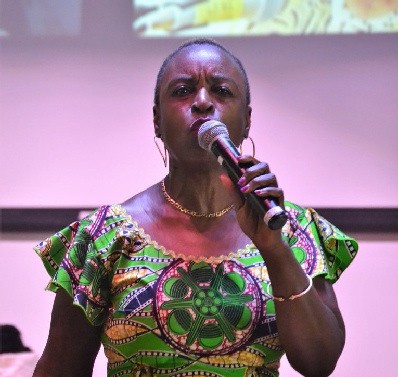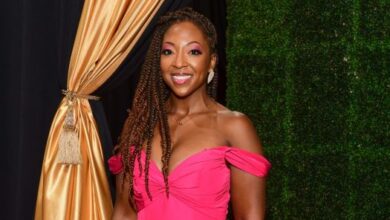10 Questions with Njeri Plato-Executive Director, Delou Africa


SOUTH FLORIDA – 10 Questions with Njeri Plato-artistic director and founder of Delou Africa Dance Ensemble
-
Tell us about Dance Africa Miami
DanceAfrica Miami was inspired by Dr. Charles “Chuck Davis also known as Baba (means father in many African Languages).
Baba Chuck transitioned on May 14, 2017.
In 1977 he founded and was the Artistic Director of DanceAfrica, the acclaimed national festival network sponsored by Brooklyn Academy of Music (BAM) located in Brooklyn New York.
Baba Chuck visited Delou’s 2nd annual African Diaspora Dance & Drum Festival of Florida (ADDDFF) in 2011. He immediately fell in love with Delou’s positive energy and became Delou’s mentor and consultant.
Baba said, and I quote,” I will work tirelessly to see this project come to fruition and reach as many communities (locally, nationally and internationally) through the annual Delou Cultural Festival ADDDFF.”
Delou Africa, Inc. was founded by Delou Africa Dance Ensemble (DADE), a traditional West African dance, drum, and music performing arts company that provides a platform to showcase and preserve African heritage in South Florida.
In 2010, DADE expanded their brand to include a more in-depth community outreach which resulted in the creation of Delou Africa, Inc., an educational, cultural arts community based non-profit 501(c)(3) organization that enhances cultural awareness and empowers individuals to embrace diversity through our artistic, educational programs and events for children, families, and adults.
In 2016, Delou’s annual festival developed a partnership with DanceAfrica the acclaimed national festival network. This collaboration increased the festival audience and established the festival as DanceAfrica, Miami. This year Delou Africa will celebrate their 10th anniversary.
-
How long have you been dancing?
Since my existence. As a youth at family gatherings, I kept the party alive. I move to any beat that speaks to my soul. In 1977 I began taking West African folklore dance at the Uhuru Sasa Shule located in Brooklyn New York. I currently teach community dance classes and make special appearances in some of our concert performances. To answer your question, I have been dancing West African folklore for forty-two years
-
How does Delou Africa build cultural gaps?
Delou Africa builds cultural as well as communal gaps by enhancing social and cultural awareness through artistic expression in West African folklore dance, drum, music, art, and history. We empower individuals to embrace diversity and promote unity through the universal expressions of movements, rhythms, and mutual respect for all cultures. When participants come together for Delou Africa’s events, they usually ask when are you having this event again?
-
What have lessons from your dance training proven most valuable?
The most valuable lesson in my West African dance training is freedom of expression.
Traditional West African dance, drum & music has a healing effect on my life. I was diagnosed with multiple sclerosis 25 years ago, and dancing has kept me positive, mobile, and uplifted. When I express myself through dance and music, the ancestral realm Transcends my being and relieves my pain. It gives me the energy and wisdom to continue my cultural, artistic journey.
The passion, love, and devotion that I have for African art form allows me to showcase, educate, and preserve the rich tradition of West Africa through the arts.
5. Who/what inspires you most in your dance career?
My very first West African dance experience was at the Uhuru Sasa Shule in Brooklyn New York, and Hazel Bryant taught the class.
Hazel was one of the lead dancers for the International African American Ballet. She taught me that traditional African dance along with the music has history, and my expression and movements must depict the story being told. Hazel Bryant inspired me to continue my training in West African dance, drum, and music.
Other dance inspirations are Katherine Dunham, Pearl Primus, Dr. Charles Davis, Youssouf Koumbasa, Marie Basse-Wiles, and others.
-
Top 5 Things a Dancer Thinks About While Performing
Breathe
Relax
Focus
surroundings
Communication
-
Tell us what your favorite aspect of Dance Africa Miami is?
I am involved in every aspect of the festival, and it’s multiple components such as dance & drum workshops, children’s village, our better living health fair and symposium, African fashion showcase, vendors marketplace but having all the talented artists that represents different regions of the Diaspora performing on DanceAfrica Miami’s festival concert stage is one of the highlights of Delou Africa’s festival.
-
Last-minute changes… Tell us about when that happens.
As Executive Director of Delou, my goal is to keep everyone calm, cool, and collective. My approach to last-minute changes is to find a simplistic solution. For the past nine years, we have not had many last-minute changes that were not quickly resolved. I find comfort in knowing that all things planned or unplanned happen for reasons beyond our control.
-
What do the past ten years mean to you?
My 10-year journey affirms that my ancestors have created a path that aligns my purpose with my vision and my artistic endeavors.
-
Lastly, what does dance mean to you?
Dance, to me, is an inner vibration that transforms emotions into movements of expressions.
For ten years Delou Africa, Inc. has celebrated the cultural diversity and resilience of African dance and music with a vibrant variety of traditions from throughout the Diaspora.
This year’s Dance Africa Miami -African Diaspora Dance & Drum Festival of Florida will take place August 2-4, 2019 at Little Haiti Cultural Complex (212 NE 59th Terrace, Miami, FL 33137).
DanceAfrica Miami is set to be an exceptionally high-spirited, three-day family-friendly, multi-cultural arts, and educational event.
This program is made possible with the support of the Miami-Dade County Department of Cultural Affairs and the Cultural Affairs Council, the Miami-Dade County Mayor and Board of County Commissioners, The State of Florida Department of State, Division of Cultural Affairs and the Florida Council on Arts and Culture, The City of Miami, The Little Haiti Cultural Complex and The Greater Miami Convention & Visitors Bureau.


